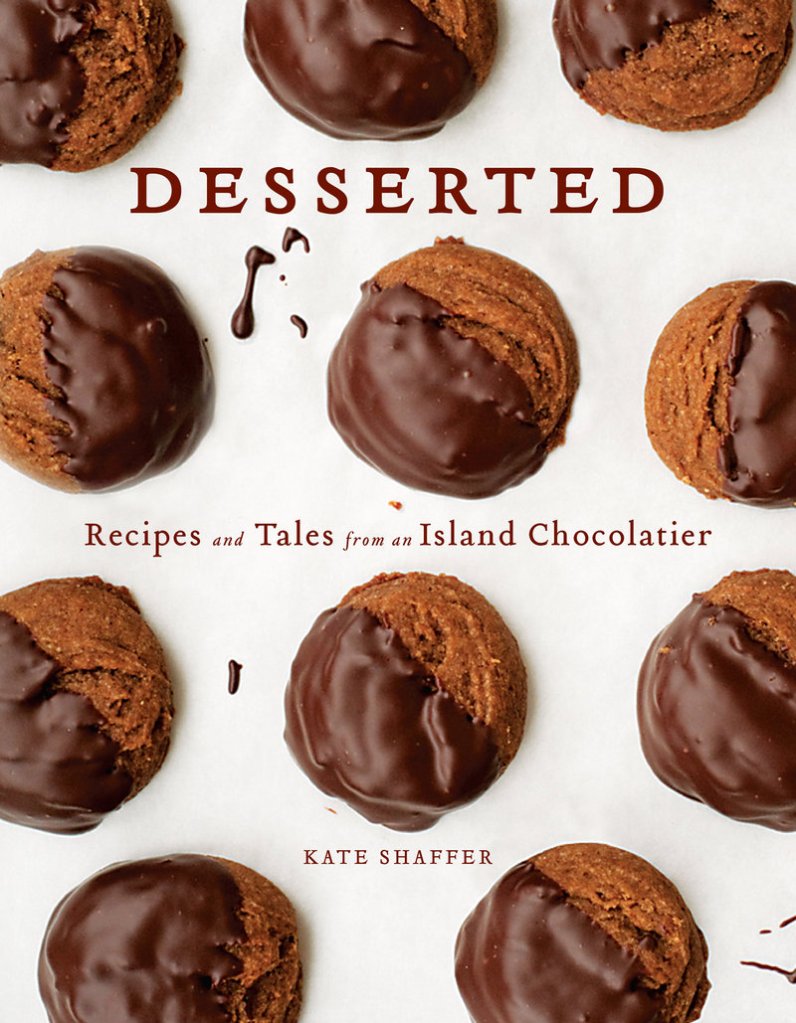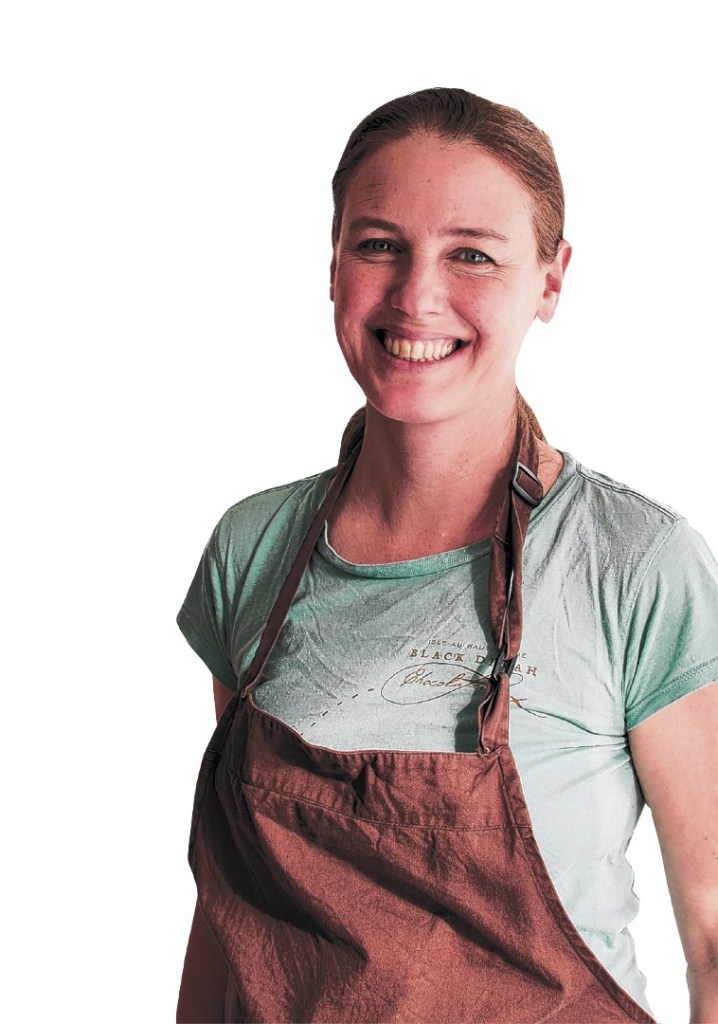Kate Shaffer, a California native, moved to Maine in 2000 to be with her husband, Steve.
They lived in Bucksport at first. Kate
landed a job as the cook for the Keepers House Inn on Isle au Haut, and she began commuting to the island – out to the island for four or five days at a time, then home for two days.
By 2004, the couple had moved to Isle au Haut. When the innkeepers announced their retirement and it looked as if Kate would be out of work soon, she began experimenting with making chocolate truffles.
That was the beginning of Black Dinah Chocolatiers.
The Shaffers now have a small cafe on the island. They sell their chocolates in Portland at LeRoux Kitchen and Browne Trading Co., and online at blackdinahchocolatiers.com.
Kate Shaffer, 39, writes about her transition from cook to chocolatier in “Desserted: Recipes and Tales from an Island Chocolatier” (Down East, $29.95).
Q: Your chocolates always look so elegant. Are you completely self-taught, or did you go for some kind of chocolatier training once you decided this is what you wanted to do?
A: I never say I’m self-taught. That’s one thing I really try and veer away from, because everything I’ve learned, I’ve learned from somebody else. That said, I spent a lot of time reading, and I spent a lot of time making thousands of mistakes in my own kitchen. Then I also took an online chocolate-making course through Ecole Chocolat. They’re based in Vancouver. That was a three-month online course where you had unlimited access to instructors, a lot of reading materials, a lot of back and forth between the other students. It was pretty comprehensive. And then, about a year after I took that course, I actually did a weeklong workshop at a chocolatier on an island off of Vancouver.
Q: How hard was it in the beginning? You mentioned making a lot of mistakes.
A: Oh, yeah. (Laughs.) More than I can count. Definitely. And then I started making less and less mistakes. It took a long time to really get it right. Chocolate making isn’t super difficult, it just takes a lot of exactness and patience — none of which I have — and organization and perseverance.
Q: You have a really good explanation of tempering in the book. Do you think a lot of people are intimidated by chocolate?
A: Yeah, I do, and I don’t think there’s any reason for it. I think people are afraid of making mistakes. I think they’re afraid they’re going to ruin it. Yeah, you can ruin some chocolate, but you can always do something with it. I mean, that’s one thing I’ve really learned on the island, is that sometimes you make a mistake and you still have to make it work somehow, because you can’t run out to the grocery store and get more ingredients, you know. That’s just not available. So you get really good at creating something new out of something that you’ve ruined, or learning how to fix what you’ve done wrong.
Q: How did you develop the ideas for different kinds of chocolates? Did you look at what else was out there, or did you try to find a niche no one else was filling?
A: A little bit of both. My background was not in confections or pastry or anything. I was a cook, and I’ve been doing it for long enough that I think about food 24 hours a day, seven days a week, so a lot of my ideas come that way. But also yeah, absolutely, I did market research. I ordered chocolate from everywhere.
Q: Tough job.
A: Yeah, I know. (Laughs.) And there’s a lot of really great stuff out there. There’s been an emergence of really great independent chocolatiers in this country in the past 10 years, so yeah, I think there was a lot of getting ideas from those guys. Another great asset I have is a husband who is completely unable to think inside the box, so he comes up with some pretty wild ideas.
Q: Like what? Can you give me an example?
A: We have a cafe on the island that we run seasonally, but we kept it open one night a week through one winter on the island, where we’d just invite the community to come play games, and everyone would bring cookies and we’d just supply the coffee. And one of the kids brought their peanut butter cookies one night, and (my husband) dunks the peanut butter cookie in the coffee and he says, “Oh, Kate, you’ve got to make a chocolate like this.” I said, “I don’t think so. Peanut butter cookies and coffee? That doesn’t sound right to me.”
But we made a coffee-peanut bar, and it’s our most popular chocolate bar that we have.
Q: Do you spend all your time now dealing with production and distribution of your current line, or are you always thinking about new things you could make?
A: I long to create new things. However, I have no time to do it at the moment. We just built a new commercial kitchen. Since 2007, I’ve been working out of my home kitchen, and from that kitchen, we have produced 150,000 truffles a year, and that doesn’t include bark or other things. So we built a new commercial facility on our property on the island, and once we get our systems in place — we just moved in a couple of months ago — I think that will free up more time to create product.
Q: Do you think living on an island will limit the amount you can grow the business? Do you even want it to grow, or would that mean at some point having to move off the island?
A: Yes, we want to grow it. And we also want our base of the business to always be on Isle au Haut. It’s kind of a tricky thing. I feel like we have this sort of set idea of how businesses grow, that they just get bigger and bigger and bigger. But I think that there’s a way to grow a business that keeps it small. So when I think of growing the business, I think of maybe moving certain things off-island.
But also there is a vision of having a shop off-island where we can sell our chocolates, and to move that cafe model outward. We have this great production facility now; it would be silly to move it.
Q: Is it hard to run this business from a remote island?
A: Yes, islands definitely have their very specific difficulties as far as running a business, but the benefits, I think, far outweigh them. For instance, you have to lug everything onto the boat in Stonington, then off the boat in Isle au Haut, and then lug it to your house on the island. That’s a lot of lugging. And it definitely offers difficulties as far as getting products to our wholesale clients at a reasonable rate.
But the benefits are amazing. We get to live in this community that is so supportive, and work with people that we live next to. And it’s a great story; people like the idea of doing this wonderful thing, like making chocolate in the most beautiful place on Earth.
Q: In the book, you mention a boy on the island who asks you if he can barter lobsters for chocolate. Do you get a lot of requests like that?
A: Absolutely. We do a lot of barter. Particularly in the summertime for lobster, we do a lot of barter. I think it’s a pretty good deal, myself. I think I make out pretty good.
Q: Do you eat chocolate every day?
A: I like chocolate now more than I ever have. I have some chocolate every day. Mostly it’s work related, like does this taste right, or do I need to adjust an ingredient here or there? Sometimes the smell gets to me, it’s too much.
But every day, I like it more.
Staff Writer Meredith Goad can be contacted at 791-6332 or at:
mgoad@pressherald.com
Twitter: MeredithGoad
Copy the Story Link
Send questions/comments to the editors.





Success. Please wait for the page to reload. If the page does not reload within 5 seconds, please refresh the page.
Enter your email and password to access comments.
Hi, to comment on stories you must . This profile is in addition to your subscription and website login.
Already have a commenting profile? .
Invalid username/password.
Please check your email to confirm and complete your registration.
Only subscribers are eligible to post comments. Please subscribe or login first for digital access. Here’s why.
Use the form below to reset your password. When you've submitted your account email, we will send an email with a reset code.